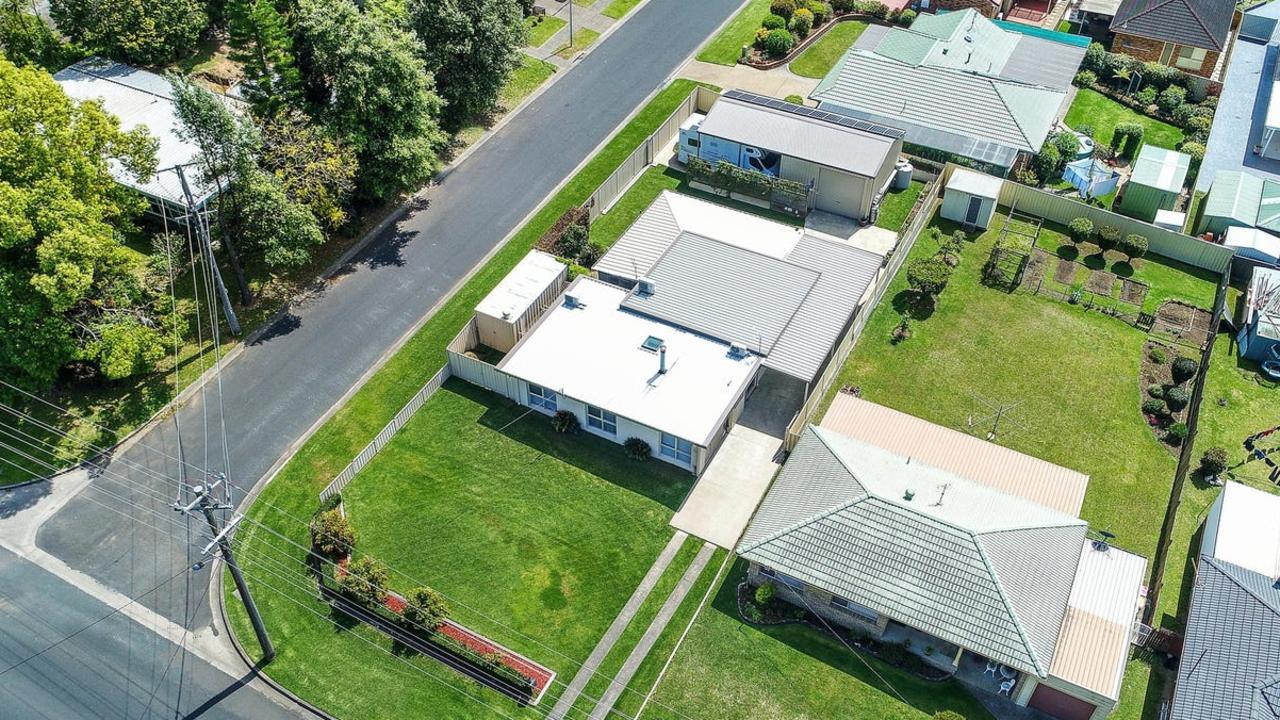Local sustainable farms bring new tastes to the south coast
From exotic Scottish beef to sustainably sourced oysters and chickens, the south coast is rich with environmentally-conscious taste sensations that have taken the region by storm. See what the coast has to offer.
The South Coast News
Don't miss out on the headlines from The South Coast News. Followed categories will be added to My News.
Passionate local farmers and food producers have brought a range of new taste sensations to the south coast in recent years, using sustainable methods that not only allow them to live off the land but improve it, too.
From oyster farming to wine and beef, these homegrown sustainable companies are paving the way for a better future and delicious produce.
Wapengo Oyster Farm
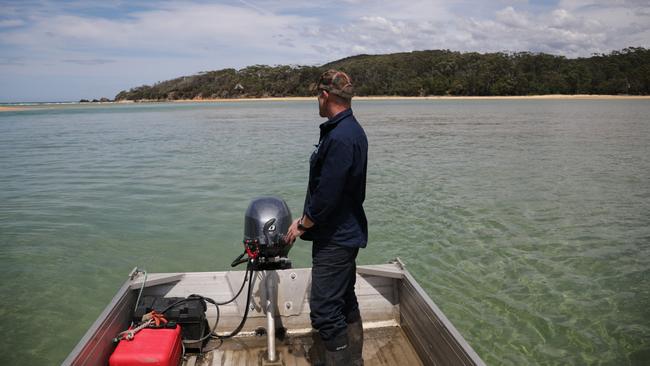
When it comes to sustainable farming, Wapengo Oyster Farm manager John Blankenstein said you would be hard pressed to find something more sustainable than rock oyster farming.
Wedged between Tathra and Bermagui, the Wapengo farm is one of five oyster farms on the south coast part of the Australia Oyster Coast network.
For decades, south coast businesses have benefited from the spoils of the sea, from a variety of fish species to oysters and mussels.
Mr Blankenstein said it was the rock oyster though, that really stood out as a species unique to the region.
“We’ve got this 100 per cent uniquely Australian shellfish, that isn’t found anywhere else in the world,” he said.
“Unlike the Pacific oyster, it’s complex in nature.
“It’s what we refer to as a fine food because its complex and has subtle nuances.”
No two rock oysters taste the same, said Mr Blankenstein.
“Every oyster has its own subtle trademarks,” he said.
“That’s reflected in what we call the umami, or the wow factor.
“You’ve also got that saltiness, that brine, which is encapsulated in the body of the oyster, and you’ve got the sweetness and the creaminess, too.
“That’s taken on from being specifically grown and nurtured in this environment.”
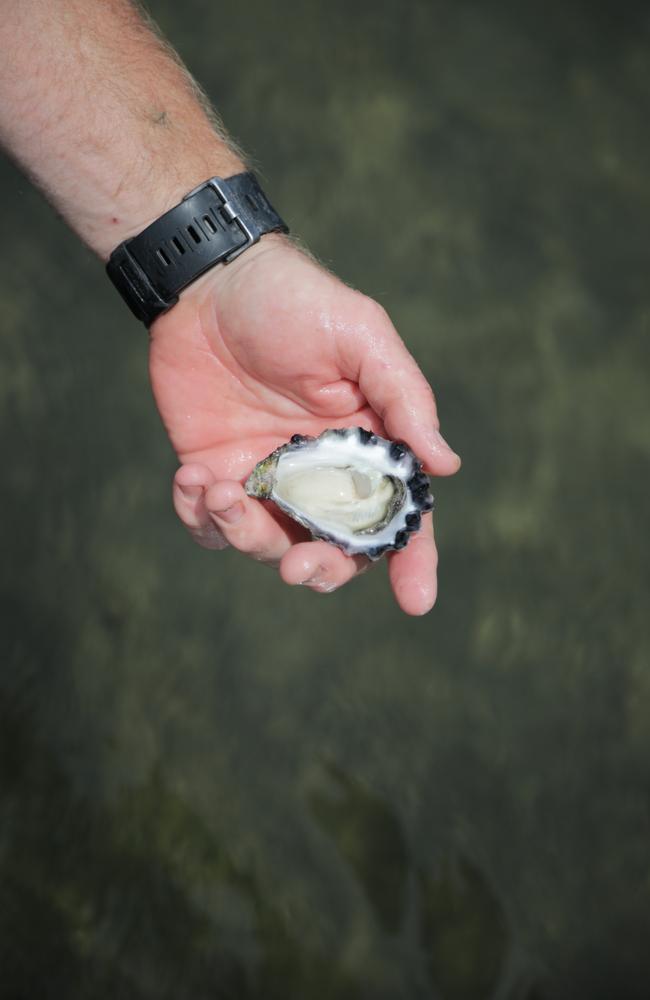
When it comes to rearing good oysters, Mr Blankenstein describes the waters of the south coast as a melting pot of flavours.
“You’ve got this salt water coming in, and you put it in this big cauldron, and you’ve got this freshwater coming down, and put it in a cauldron,” he said.
“You’ve got all these minerals that are filtered through the soil, and detritus that falls from the tress.
“It’s so complex to get your head around, but what that does is it produces flavours that resonate.
“They resonate with people.”
Mr Blankenstein said oysters helped people become in tune with the local environment, making them aware of their surrounds and what positively or negatively effects the environment.
Oysters are like the canaries of the ocean, Mr Blenkenstein said, purifying the water and providing a gauge of its health.
“On an environmental level, oyster farming creates a unique ecosystem where other invertebrates can thrive,” he said.
“Once we produce an oyster, that ends up on a table in a restaurant and hopefully comes a story of provenance, and where it came from.
“Once that's articulated, that resonates with people.
“And, that brings people to the area, too.
“It flows on, and flows on, and flows on.”
The positive influence of oyster growing is also felt in the community, Mr Blankenstein believes.
“There’s a community benefit, too,” he said.
“A farm needs people to work. It provides full time jobs which can be hard to find in a small rural area.”
Bega Valley Eggs
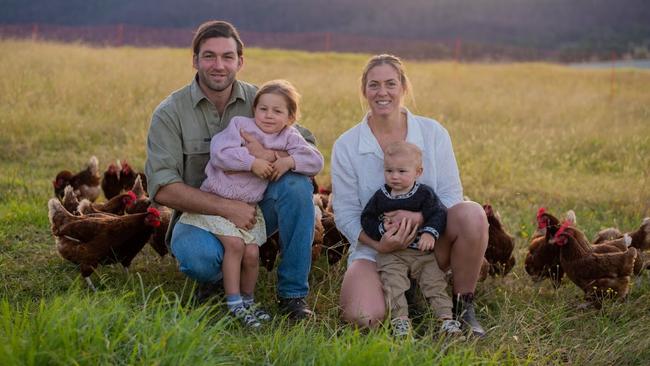
The ethical advantages of free range eggs are well known but Bega Valley Eggs owner Joscelin McMillan has taken it one step further with her flock of “pasture-raised” eggs.
Unlike free range eggs, Ms McMillian said pasture-raised chickens have uninhibited access to the outside, entering or exiting their roost as often as they want.
“There’s no doors locked, and they can come out as often as they want. Rain or shine,” she said.
Ms McMillian took over the business with her husband Tom McMillian in 2019.
Since then, the young couple have strived to do what they can to nurture the land and provide a safe, chemical-free environment for their children.
“Rather than just being sustainable, we’re always trying to improve the land,” she said.
“When our chickens are rotated through our paddocks, their manure is being dropped on the ground, which is fertilising the soil.
“We’ve noticed an increase in the amount of species of grass, as well as other plants within the paddock, as a result.”
The popular Mossy Cafe on Mossy Point is just one of many local shops and markets that stock the McMillian’s eggs.
Throughout the region, there are 50 shops that sell their pasture-raised eggs, including Woolworths supermarkets in Batemans Bay and Eden.
“People who are using our eggs noticed the quality and once they try it they don’t want to go back to regular free range eggs,” Ms McMillian said.
“They’re giving their customers a higher nutritional quality in the pasture raised egg, because they’ve got so much more variety in their diet.
“They’re also supporting local business and they’re supporting regenerative farming.”
Mogendoura Farm
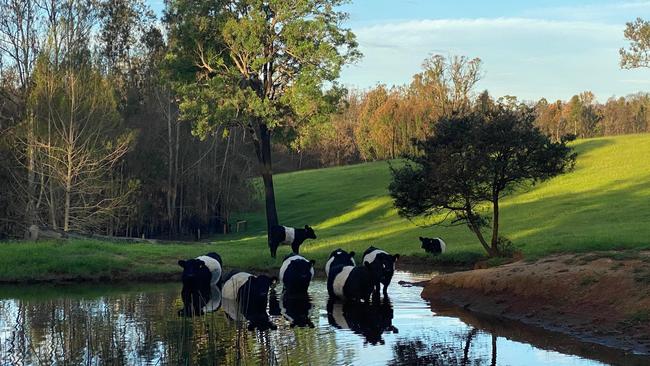
While it may not yet have the same pedigree as angus or wagyu beef, belted galoway beef is something Mogendoura farm owner Emma Lipscombe said all self-confessed meat-eaters must try.
The traditional Scottish breed is renowned for its tender and juicy meat, as well as its rarity in faraway Australia, Ms Lipscombe said.
“They don’t have that traditional fatty outer layer,” she said.
“The saturated fats are gently marbled through the meat.”
Despite being from the highland country of the British Isles, the belted galloway have had a positive effect on the land, Ms Lipscombe said, and keep down many noxious weeds common to the area.
When Ms Lipscombe took over Mogendoura Farm near Moruya nine years ago, she said the land was in dire straits.
“We aren’t from a farming background,” she said.
“But the paddocks were very depleted of their soil nutrition.
“We’ve done a lot over the years to improve it, including the promotion of dung beetles.”
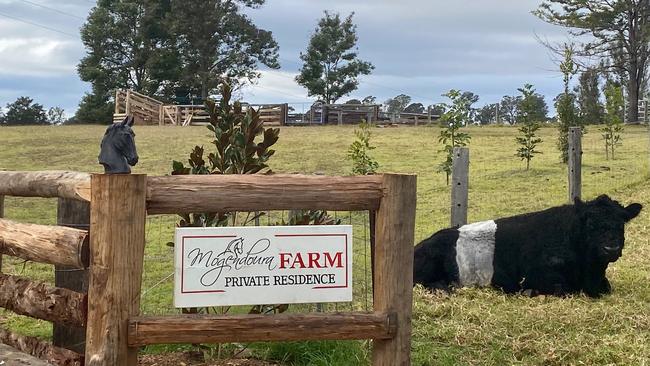
The insects collect the cow pats and move them to other areas of the farm, she said, and burrow down into areas of poorer soil and help break it up.
Ms Lipscombe’s passion for her cows has seen her through many hardships after losing more than 20 of her herd in the Black Summer fires.
There’s still a lot of work to be done before the farm is fully operational again, but after the birth of a new homegrown Galoway calf called Tulip on Tuesday, she is hopeful.
All of Ms Lipscombe’s cows have names, she said.
“There’s a passion about raising sustainable foods in the most ethical way I can,” she said.
“It’s always sad to send one (to the butcher).
“At least I feel I could give them the best living that I can give them.”
In addition to selling her beef to the Sage Farmers Market, Ms Lipscombe also hosts a number of events and guest experiences at her farm.
There is accommodation available on the property, as well as sustainability workshops throughout the year.
Visitors can even meet with and pet the cows.
“I want people to bring all their lovely energy back to the farm after being smashed by the fires,” she said.
Cuppitt’s Winery and Restaurants
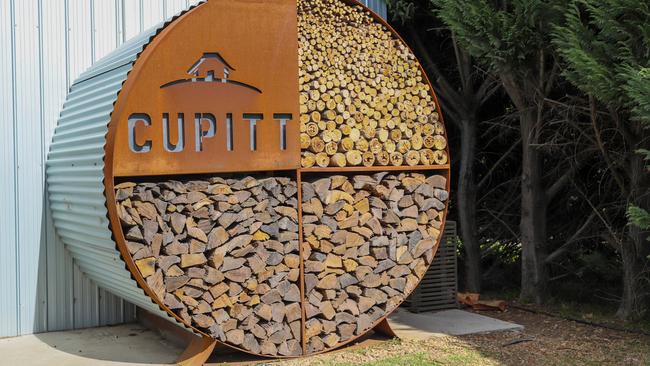
After founding their business on the principle of promoting regional talent, the family-run Cupitt’s Winery and Restaurants has become a popular destination for wine, food and beer lovers alike.
The Ulladulla estate was founded in 2007, with winemaker and founding family member Rosie Cupitt at the helm of the winery’s first batches.
Customer experience manager and family member, Libby Cupitt, said as time went on and the business grew, the winery has stayed intent on keeping production local.
So local, in fact, that Ms Cupitt said everything used in their wines and beers in raised on the estate.
“The focus has been that we grow and make everything on site, (that) being cheese, wine, beer and all the vegetables,” she said.
“In sustainability terms, the principle is of low food miles.
“We try to have a bit of a closed loop system, so all organic matter is to not leave the property as much as possible.
“All the scraps get fed to the chickens and ducks, or go into the compost or the worm farms, and then that gets returned to the soil that we grow or the vegetables in.”
Unlike a lot of restaurants, Ms Cupitt said the estate dramatically lowers its food wastage, with even the spent grain from the beer being fed later on to the cows located on the farms.
“We look for ways to use by-products as much as possible in the things that we are making,” she said.
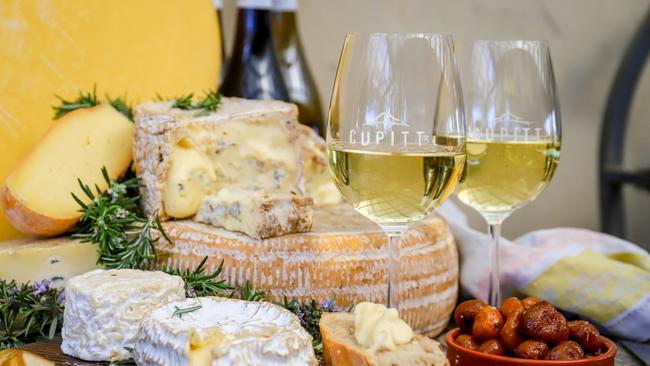
“Our industry tends to generate a lot of wastage and uses a lot of energy in cold rooms, but, wherever possible, we try to improve on what we’re doing.
“We’re constantly looking for new technologies and innovations that can help us be better, and continuously strive to be as sustainable as we possibly can.”
With five members of the Cupitt family at the farm each day, Ms Cupitt said the intergenerational connection the family has with the land is deeply important.
“We want the farm to stay in the family for generations, and (be) handed down to our kids who can keep building on that legacy and have not only a great business for people to visit, but something that’s really important to the community,” she said.
“We employ more than 100 people here and our contribution to the local economy is something we’re really proud of.
“We try to always build on being a destination for visitors to come and a reason to come to the south coast, which helps all the other businesses in the area that benefit from tourism.”
Ms Cupitt said the winery’s extensive selection of wines, beers and food are available online, as well as in many local bars, bottle shops and restaurants.
Tilba Real Dairy
After starting with just a single jersey cow almost two decades ago, the Tilba Real Dairy has grown to become one of the region’s largest manufactures of milk-based products, from cheese to ice-cream and milkshakes.
Located in the idyllic Tilba Tilba Valley, the milk factory has grown substantially, owing to its herd of jersey cows and the influence of the unique Terre Noire, or black country, of the Tilba region, according to the Tilba Real Dairy website.
“Milk for the Tilba Real Dairy brand is drawn from two sources, our home farm, ‘Mountain Valley’ in the Tilba Tilba Valley and the Salway’s pure jersey herd in the Cobargo area.
“We choose to milk jersey cows for many reasons – they are such beautiful animals – and they produce milk high in butter fat and protein, have a lower environmental impact on our farm and they are delightful to see grazing in the fields surrounding our farm.”
The ABC Cheese Factory in Tilba has become a popular destination for tourists and would-be turophiles.
The factory produces a range of milk-based products, according to the website, including bottled milk, yoghurt, cream and many cheese varieties.
“The ABC Cheese Factory is all about making delicious best quality dairy products from beautiful fresh local milk – we love visitors to our area and people who live here to come and try our delicious products and take some goodies home to enjoy with family and friends,” according to the website.
“We want your visit to the ABC Cheese Factory to be an experience that you wont forget in a hurry.”
The factory was awarded gold in the South Coast Tourism Awards in 2015, and the Excellence in Small Business in 2016 for the Eurobodalla Shire and then went on to be nominated winner of the regional area.
Tilba Real Dairy products can be found on-site, online, and in stores across the region.
Clyde River Berry Farm
Based within the Brooman State Forest, the Clyde River Berry Farm offers foodies a chance to pick their own fresh fruit.
The farm’s fresh blueberries can be found in local farmers markets throughout December and November, but it is the pick-your-own berry experience available in January that really sets the farm apart.
“Surrounded by a pristine environment, the Clyde River Berry Farm invites you to take a forest drive into the hinterland and enjoy the hands on experience of picking your own berries,” according to the Clyde River Berry Farm website.
“The Clyde Valley’s microclimate was chosen as being highly suited to blueberries in particular.
“Our policy has always been to impact as little as possible on the ecosystem and to co habit with the wildlife.
“The farm’s geographic isolation means that we produce in a healthy, dynamic and biodiverse environment, where the menagerie of birds and insects can work in our favour by keeping populations in balance.
“We have used as many sustainable techniques of production as possible and have a tolerant approach to insect dynamics. We use biological controls when necessary. In these ways we have tried to maintain the integrity of the area while producing food commercially.”
In addition to blueberries, the farm also grows strawberries and blackberries, depending on the season’s yield, which are also used to create jam. Local honey is also available at the farm.
“called ‘Bush Honey’ as it is produced by the bees foraging in local forests and understorey shrubs,” according to the website.
“It’s pure and clean with rich and varied flavours determined by the season and what is flowering.”
Winderong Farm
Encompassing regenerative agriculture, bush regeneration, permaculture, and sustainable community living, the Winderong Farm is an self-professed experimental farm with lofty goals.
Set on 810 acres of “stunning” wilderness and farmland, the farm produces a range of products, including butter pickles, tomatoes and pesto, according to the Winderong Facebook page.
“Our community consists of a group of between 10 and 15 volunteers and paid workers along with a host of beautiful and much loved farm animals and wildlife,” according to the Facebook page.
“We aim to embody the permaculture principle of ‘we are nature working’ and develop a deep understanding and respect for the land we steward, all the time aiming to regenerate the earth and learn from her and each other.”
Last month, the farm hosted its first ever corroboree session, full of local cuisine.



